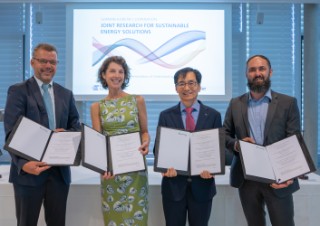
Research findings from the »IndiFiduell« project attracted considerable attention at the 42nd European Photovoltaic Solar Energy Conference and Exhibition (EU PVSEC): the poster presentation by Stephan Großer and the team of authors was honored with one of the prestigious Best Poster Awards. In addition to Stephan Großer, Alexander Müller, Robert Göckeritz, Tobias Nitsche, Daniel Buckland, Giuseppe Galbiati, and Bengt Jäckel are among the authors.
more info Fraunhofer Center for Silicon Photovoltaics CSP
Fraunhofer Center for Silicon Photovoltaics CSP







